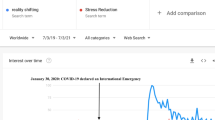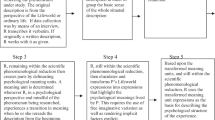Abstract
How does the clinical encounter work? To tackle this question, the present study centers on the paradigmatic clinical encounter, namely, psychoanalysis, paradigmatic in that it is structured by the encounter itself. Our question thus becomes: how does the clinical encounter work, when its only modality is speech? By reading Jacques Lacan and Emmanuel Levinas together, we better identify how speech sets up as subjects those who address one another and how this subjectivation touches the suffering body specifically. In this framework, a definition of the encounter is put to work: The encounter of a sufferer and a listener, that is, the clinical encounter, is the opening of an inter-human space beyond suffering. This conception of the encounter permits a specifying of the violence it avoids—respecting the transcendence of the other irreducibly other—but also the violence that it mobilizes—through a presumption of subjectivity imposed upon the other, by which the subjectivation at work in the encounter is, by definition, a subjection to the other. This outlines, then, an ethics of the clinical encounter: a relationship of man to man commanded by one sensing body to another, i.e. a minimal and therefore radical ethics that is structured as a sensible ethics between speaking bodies.
Similar content being viewed by others
Notes
Lacan (2006d, p. 206).
Levinas (1981, p. 77).
Merleau-Ponty (1994, p. 71).
Merleau-Ponty (1994, p. 71).
Freud (1953, p. 266).
Merleau-Ponty (1994, p. 71).
Notice that speech remains the ineliminable ingredient of all clinical practice, including in techno-scientific contexts.
Lacan (1988, p. 108).
Ibid.
Ibid.
Ibid.
Legrand (2015d).
Levinas (1998, p. 93).
Ibid. (p. 94).
Ibid.
Iibd. (p. 93).
Iibd. (p. 94).
Ibid. (p. 93).
Levinas (1979, p. 238).
Ingerslev and Legrand (2017, in press).
Levinas (1979, p. 53). Here, Levinas speaks particularly of the work of memory “Memory recaptures and reverses and suspends what is already accomplished in birth—in nature. […] By memory […] I assume today what in the absolute past had no subject to receive it and had therefore the weight of a fatality. By memory I assume and put back into question. Memory realizes impossibility: memory after the event, assumes the passivity of the past and masters it” (Ibid.). We reroute the remarks in the setting of the present reflection; we are leaning on the fact that, in analysis at least, the work of the encounter and the work of memory are indissociable from one another.
Lacan (2006d, p. 241).
Ibid. (p. 245).
Lacan (2006b, p. 176).
Ibid. (p. 177).
Legrand (2015a).
Lacan (Lacan 2006d, p. 247).
Ibid. (p. 248).
Lacan (Lacan 2006b, p. 178).
Freud (2014, p. 3).
Lacan (1988, p. 108).
Merleau-Ponty (1968). Here, Merleau-Ponty expresses this in ontological terms: We are “two entries to the same being” (Ibid., p. 82).
Merleau-Ponty (2012, p. 304).
Ibid. (p. 354).
Ibid.
Ibid.
Ibid. (p. 305).
Ibid. (p. 358).
Ibid. (p. 355).
Ibid. (p. 354).
Merleau-Ponty (1964, p. 29).
Maldiney (2007, p. 68).
Ibid. (p. 67).
Lacan (1988, p. 108).
Ibid.
Levinas (1979, p. 195).
Ibid.
Legrand (2017b, in press).
Ibid. (p. 131).
Legrand (2015c).
Levinas (1981, p. 112).
Ibid.; translation modified; emphasis added.
Ibid. (p. 122).
Ibid. (p. 106).
Ibid. (p. 112).
Ibid. (p. 53).
Lacan (2006a, p. 66).
Lacan (1988, pp. 239–240).
Levinas (1979, p. 195).
Lacan, 1998, p. 182; translation by M. G. Butler.
Ingerslev and Legrand (2017, in press).
Lacan (Lacan 2006c, p. 515).
Lacan (2006c, p. 627).
Ibid. (p. 525).
Levinas (1981, p. 74); emphasis added.
Levinas (2000, p. 170).
Ibid.
Ibid. (p. 169).
Ibid. (p. 170).
Levinas (1979, p. 79).
Levinas (2000, p. 171).
Ibid. (p. 170).
Ibid.
Ibid.
Levinas (1979, p. 79).
Lacan (2006a, p. 72).
Ibid.
Ibid.
Freud (1954, p. 379).
Ibid.; emphasis added.
Lacan (1999, p. 51).
Levinas (1979, p. 79).
Translator’s note: I have rendered sensibilité and sensible interchangeably as sensitivity/sensibility and sensitive/sensible respectively, depending on context.
Legrand (2017b, in press).
Levinas (2005, p. 33).
Ibid. (p. 33).
Levinas (1981, p. 77).
Derrida (1998).
Levinas (1979, p. 265).
Levinas (1979, p. 265).
Levinas (1981, p. 51).
Levinas (2000 p. 171).
Levinas (1981, p. 86).
This description of the horizon is loosely inspired by Anthony Poiraudeau, a historian of art who works on the “engineering of place” and who discusses the position of George Didi-Huberman on this point in particular: The concept of the horizon. For Didi-Huberman, the horizon is a limit, that which is far off, transcendent, beyond oneself, and inaccessible. See: Poiraudeau (2007).
Levinas (1979, p. 258).
Levinas (1981, p. 137).
Fédida (2012, pp. 10–11); translation of this text by M. G. Butler.
Ibid. (p. 11).
Ibid.
Ibid.
Levinas (1981, p. 126).
Ibid. (p. 127).
Ibid. (p. 139).
Ibid. (pp. 13–14).
Levinas (1979, p. 219).
Derrida and Kamuf (2002, p. 240).
Ibid. (p. 254).
Ibid.
Ibid.
References
Binswanger, Ludwig. 1975. Being-in-the-world, selected papers. Tr. J. Needleman. London: Souvenir Press.
Brockelman, Thomas, and Dominiek Hoens. 2013. Special issue: The object of psychoanalysis: Jacques Lacan’s ‘object a’. Continental Philosophy Review 46: 2.
Derrida, Jacques. 1991. Responsabilité et Hospitalité. In Autour de Jacques Derrida: Manifeste pour l’hospitalité, ed. Mohammed Seffahi. Paris: Paroles d’aube.
Derrida, Jacques. 1998. Monolingualism of the other, or, the prosthesis of origin. Stanford: Stanford University Press.
Derrida, Jacques. 2000. Of Hospitality: Anne Dufourmantelle Invites Jacques Derrida to Respond, trans. Rachel Bowlby. Stanford: Stanford University Press.
Derrida, Jacques, and Peggy Kamuf. 2002. Without alibi. Stanford: Stanford University Press.
De Saint Aubert, Emmanuel. 2017. Merleau-Ponty’s conception of the unconscious in the late manuscripts. In Unconsciousness between phenomenology and psychoanalysis. Contributions to phenomenology, ed. Dorothée Legrand, and Dylan Trigg. Berlin: Springer.
Fédida, Pierre. 2012. Corps du vide et espace de séance. Paris: MJW Fédition.
Freud, Sigmund. 1953. On psychotherapy. In The standard edition of the complete works of Sigmund Freud, Vol. 7, 257–268 (trans: James Strachey). London: The Hogarth Press.
Freud, Sigmund. 1954. Project for a scientific psychology in the origins of psycho-analysis: Letters to Wilhelm Fliess, drafts and notes, 1887–1902, 347–445 (trans: James Strachey). Imago.
Freud, Sigmund. 2014. Psychical (or mental) treatment. New York: White Press.
Fuchs, Thomas, and Hannah De Jaegher. 2009. Enactive intersubjectivity: Participatory sense-making and mutual incorporation. Phenomenology and the Cognitive Sciences 8: 465–486.
Fuchs, Thomas, and Sabine Koch. 2014. Embodied affectivity: On moving and being moved. Frontiers in Psychology 5 (508): 1–12.
Geymant, Maria, and Delia Popa (eds.). 2015. Approches phénoménologiques de l’inconscient. Hildesheim: Georg Olms Verlag, Europaea Memoria.
Ingerslev, Line, and Dorothée Legrand. 2017. Clinical response to bodily symptoms in psychopathology. Philosophy, Psychiatry and Psychology 3: 23.
Kleinberg-Levin, David Michael. 1999. A responsive voice: Language without the modern subject. Chiasmi International 1: 65–103.
Kleinberg-Levin, David Michael. 2008. Before the voice of reason: Echoes of responsibility in Merleau-Ponty’s ecology and Levinas’s ethics. New York: SUNY Press.
Lacan, Jacques. 1988. The seminar of Jacques Lacan. Book 1, Freud’s papers on technique 1953–1954. Cambridge: Cambridge University Press.
Lacan, Jacques. 1998. Seminaire IV: La relation d’objet. Paris: Seuil.
Lacan, Jacques. 1999. The seminar of Jacques Lacan on feminine sexuality, the limits of love and knowledge (encore) (Vol. Book XX) (trans: Bruce, Fink). New York: WW. Norton & Company.
Lacan, Jacques. 2006a. Beyond the reality principle. In Écrits: The first complete edition in English, 58–74 (trans: Bruce, Fink). New York: WW. Norton & Company.
Lacan, Jacques. 2006b. Presentation on transference. In Écrits: The first complete edition in English, 176–188 (trans: Bruce, Fink), New York: WW. Norton & Company.
Lacan, Jacques. 2006c. The direction of the treatment and the principles of its power. In Écrits: The first complete edition in English, 489–542 (trans: Bruce, Fink). New York: WW. Norton & Company.
Lacan, Jacques. 2006d. The function and field of speech and language in psychoanalysis. In Écrits: The first complete edition in English, 197–268 (trans: Bruce, Fink). New York: WW. Norton & Company.
Legrand, Dorothée. 2015a. Comment l’interlocution de la rencontre clinique œuvre-t-elle sur la souffrance psychique ? Perspectives Psychiatriques 3 (54): 214–221.
Legrand, Dorothée. 2015b. Le corps assujetti. In Approches phénoménologiques de l’inconscient, ed. Maria Geymant, and Delia Popa, 211–227. Hildesheim: Georg Olms Verlag, Europaea Memoria.
Legrand, Dorothée. 2015c. The body and its image in the clinical encounter. In Philosophy of mind and phenomenology. Conceptual and empirical approaches, ed. D. Dahlstrom, A. Elpidorou, and W. Hopp, 79–97. London: Routledge.
Legrand, Dorothée. 2015d. The living body and the lived body in the clinical encounter: How does the body shape ethical practice? In Handbook of the philosophy of medicine, ed. T. Schramme, and S. Edwards, 1–19. Berlin: Springer.
Legrand, Dorothée. 2017a. Is there a phenomenology of unconsciousness? Dialogues with Heidegger, Merleau-Ponty, Levinas. In Unconsciousness between phenomenology and psychoanalysis. Contributions to phenomenology, ed. Dorothée Legrand, and Dylan Trigg, 1–19. Berlin: Springer.
Legrand, Dorothée. 2017b. L’éthique est une poignée de mains entre Maurice Merleau-Ponty et Emmanuel Levinas. In Phénoménologie de la vie, ed. Yves Charkes. Zarka, Paris: Hermann.
Legrand, Dorothée, and Dylan Trigg (eds.). 2017. Unconsciousness between phenomenology and psychoanalysis. Contributions to phenomenology. Berlin: Springer.
Levinas, Emmanuel. 1979. Totality and infinity (trans: Alfonso Lingus). Hague: M. Nijhoff.
Levinas, Emmanuel. 1981. Otherwise than being: Or, beyond essence (trans: Alphonso Lingus). Hague: M. Nijhoff.
Levinas, Emmanuel. 1998. Useless suffering. In Entre nous, thinking of the other, 91–102 (trans: Michael B. Smith and Barbara Harshav). Columbia University Press.
Levinas, Emmanuel. 2000. God, death, and time (trans: Bettina Bergo). Stanford University Press.
Levinas, Emmanuel. 2005. Humanism of the other (trans). Nidra Poller University of Illinois Press.
Lohmar, Dieter, and Jagna Brudzinska (eds.). 2012. Founding psychoanalysis phenomenologically. Phenomenological theory of subjectivity and the psychoanalytic experience. Phaenomenologica. Berlin: Springer.
Maldiney, Henri. 2007. Penser l’homme et la folie. Paris: Million.
Merleau-Ponty, Maurice. 1964. Metaphysics and the novel. In Sense and nonsense, 26–40 (trans: Hubert Dreyfus and Patricia Allen Dreyfus). Northwestern University Press.
Merleau-Ponty, Maurice. 1968. The visible and the invisible (trans: Alphonso Lingis). Northwestern University Press.
Merleau-Ponty, Maurice. 1994. Phenomenology and psychoanalysis: Preface to Hesnard’s L’œuvre de Freud. In Merleau-Ponty and psychology, ed. Keith Hoeller, 67–72 (trans: A. Fisher). New Jersey: Humanities Press.
Merleau-Ponty, Maurice. 2012. Phenomenology of perception (trans: Donald Landes). Routledge.
Mooney, Timothy. 2017. Repression and operative unconsciousness in phenomenology of perception. In Unconsciousness between phenomenology and psychoanalysis. Contributions to phenomenology, ed. Dorothée Legrand, and Dylan Trigg. Berlin: Springer.
Phillips, James. 2017. Merleau-Ponty’s nonverbal unconscious. In Unconsciousness between phenomenology and psychoanalysis. Contributions to phenomenology, ed. Dorothée Legrand, and Dylan Trigg. Berlin: Springer.
Poiraudeau, Anthony. 2007. Erotique du Paysage, de l’image et de la marche. In Vagabondages, Nicolas Frémiot. Pomponne: Trans photographic Press.
Author information
Authors and Affiliations
Corresponding author
Additional information
Translated from the French by Michael George Butler.
Rights and permissions
About this article
Cite this article
Legrand, D. The violence of the ethical encounter: listening to the suffering subject as a speaking body. Cont Philos Rev 51, 43–64 (2018). https://doi.org/10.1007/s11007-016-9405-1
Published:
Issue Date:
DOI: https://doi.org/10.1007/s11007-016-9405-1




